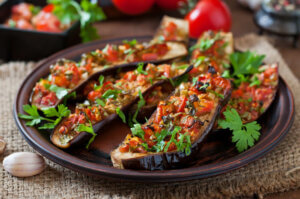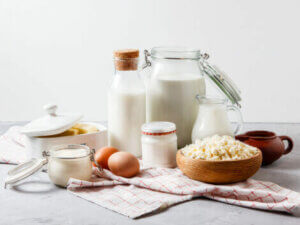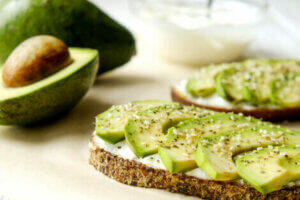What to Include in Your Diet If You're a Vegetarian Athlete

If you’re a vegetarian athlete, it’s important to pay special attention to your diet. Restricting any food group can compromise an athlete’s performance and even put their health at risk. However, if you follow some simple guidelines, this can all be avoided.
Vegetarians differ from vegans in that vegans don’t eat any food that is derived from animals. The fact that vegetarians can eat eggs or dairy products makes it much less likely that they’ll develop nutritional deficiencies. Today, we’ll look at what factors you need to consider to follow an appropriate diet.
Eggs and dairy products
If you don’t eat meat or fish, then you need to find another source of quality proteins. The good news is that eggs and dairy products are great sources of proteins as well as being easily digested and rich in essential amino acids.
By now, you probably already know that protein is essential for sporting performance. In fact, athletes are recommended to increase their protein by up to one ounce per 30 lb of body weight.
This is reflected in an article published in the Journal of the International Society of Sports Nutrition. This research shows how important protein consumption is for avoiding muscle catabolism and stimulating tissue recovery.

Eggs and dairy are a great option for vegetarian athletes. If you’ve removed meat and fish from your diet, at least make sure that you eat eggs and dairy products every day. But don’t worry if you eat a lot of eggs per week. Recent research published in 2017 has disproven the notion that eating a lot of eggs is linked to an increased risk of cardiovascular disease.
Omega-3 fatty acids
Oily fish is an important source of omega-3 fatty acids, and by removing it from your diet, you’ll obviously need to find a substitute. These lipids help to reduce muscle damage and inflammation, so you shouldn’t overlook them.
A study published in the journal Research in Sports Medicine also backs up the importance of these nutrients for muscle recovery and preventing protein catabolism.
However, the good news is that there’s another option: vegetable oils and nuts.
With oils, it’s important to consume them raw and not subject them to high temperatures. Otherwise, they’ll contain more trans-type lipids, which are linked to inflammation, according to research carried out in 2019.

It’s also important to pay close attention to your intake of omega-6 lipids. These fats are common in processed foods and also have inflammatory properties.
Ideally, you should aim to strike a balance between your consumption of omega-3 and omega-6 fatty acids, which all too often is unbalanced in favor of the latter.
A vegetarian athlete needs to pay close attention to their diet
Restricting certain food groups can certainly make it more complicated to get all the nutrients that you need. And athletes have much higher nutritional requirements, so being a vegetarian can make things even harder but not impossible.
As we’ve already mentioned, the first thing to do is to make sure that you get a daily amount of quality protein. Eggs and dairy products are great sources of high-quality proteins that stimulate growth and muscle recovery.
Vegetarians athletes also need to make sure that any inflammation in the body is under control. This means ensuring a healthy intake of omega-3 fatty acids.
Since oily fish isn’t an option, you’ll need to get these lipids from vegetable oils and nuts. Oily fruits such as avocado can also be a great choice.
However, if you suspect that you’re not able to do this alone, don’t be afraid to get in touch with a professional nutritionist or dietitian. They’ll be able to help you with your particular circumstances. Furthermore, there’s a whole range of food and nutrient supplements on the market for vegetarians and vegans that could really be helpful for athletes.
If you’re a vegetarian athlete, it’s important to pay special attention to your diet. Restricting any food group can compromise an athlete’s performance and even put their health at risk. However, if you follow some simple guidelines, this can all be avoided.
Vegetarians differ from vegans in that vegans don’t eat any food that is derived from animals. The fact that vegetarians can eat eggs or dairy products makes it much less likely that they’ll develop nutritional deficiencies. Today, we’ll look at what factors you need to consider to follow an appropriate diet.
Eggs and dairy products
If you don’t eat meat or fish, then you need to find another source of quality proteins. The good news is that eggs and dairy products are great sources of proteins as well as being easily digested and rich in essential amino acids.
By now, you probably already know that protein is essential for sporting performance. In fact, athletes are recommended to increase their protein by up to one ounce per 30 lb of body weight.
This is reflected in an article published in the Journal of the International Society of Sports Nutrition. This research shows how important protein consumption is for avoiding muscle catabolism and stimulating tissue recovery.

Eggs and dairy are a great option for vegetarian athletes. If you’ve removed meat and fish from your diet, at least make sure that you eat eggs and dairy products every day. But don’t worry if you eat a lot of eggs per week. Recent research published in 2017 has disproven the notion that eating a lot of eggs is linked to an increased risk of cardiovascular disease.
Omega-3 fatty acids
Oily fish is an important source of omega-3 fatty acids, and by removing it from your diet, you’ll obviously need to find a substitute. These lipids help to reduce muscle damage and inflammation, so you shouldn’t overlook them.
A study published in the journal Research in Sports Medicine also backs up the importance of these nutrients for muscle recovery and preventing protein catabolism.
However, the good news is that there’s another option: vegetable oils and nuts.
With oils, it’s important to consume them raw and not subject them to high temperatures. Otherwise, they’ll contain more trans-type lipids, which are linked to inflammation, according to research carried out in 2019.

It’s also important to pay close attention to your intake of omega-6 lipids. These fats are common in processed foods and also have inflammatory properties.
Ideally, you should aim to strike a balance between your consumption of omega-3 and omega-6 fatty acids, which all too often is unbalanced in favor of the latter.
A vegetarian athlete needs to pay close attention to their diet
Restricting certain food groups can certainly make it more complicated to get all the nutrients that you need. And athletes have much higher nutritional requirements, so being a vegetarian can make things even harder but not impossible.
As we’ve already mentioned, the first thing to do is to make sure that you get a daily amount of quality protein. Eggs and dairy products are great sources of high-quality proteins that stimulate growth and muscle recovery.
Vegetarians athletes also need to make sure that any inflammation in the body is under control. This means ensuring a healthy intake of omega-3 fatty acids.
Since oily fish isn’t an option, you’ll need to get these lipids from vegetable oils and nuts. Oily fruits such as avocado can also be a great choice.
However, if you suspect that you’re not able to do this alone, don’t be afraid to get in touch with a professional nutritionist or dietitian. They’ll be able to help you with your particular circumstances. Furthermore, there’s a whole range of food and nutrient supplements on the market for vegetarians and vegans that could really be helpful for athletes.
All cited sources were thoroughly reviewed by our team to ensure their quality, reliability, currency, and validity. The bibliography of this article was considered reliable and of academic or scientific accuracy.
- Jager R., Kerksick CM., Campbell BI., Cribb PJ., et al., International society of sports nutrition position stand: protein and exercise. J Int Soc Sports Nutr, 2017.
- Wium Geiker NR., Lytken Larsen M., Dyerberg J., Stender S., et al., Eggs do not increase the risk of cardiovascular disease and can be safely consumed. Ugeskr Laeger, 2017.
- Philpott JD., Witard OC., Galloway SDR., Applications of omega 3 polyunsaturated fatty acid supplementation for sport performance. Res Sports Med, 2019. 27 (2): 219-237.
- Valenzuela CA., Baker EJ., Miles EA., Calder PC., Eighteen carbon trans fatty acids and inflammation in the context of atherosclerosis. Prog Lipid Res, 2019.
This text is provided for informational purposes only and does not replace consultation with a professional. If in doubt, consult your specialist.








